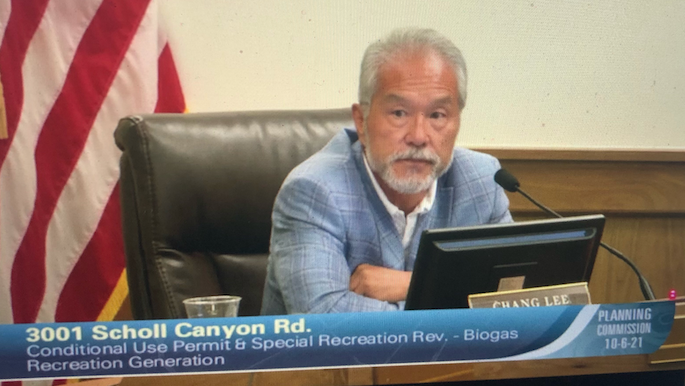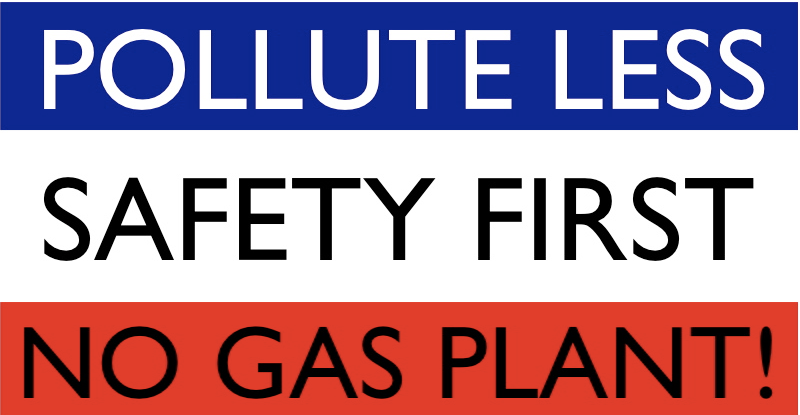CommentsGLENDALE ENVIRONMENT - A seven-year fight by East Area Progressive Democrats (EAPD) and community groups stopped Glendale from turning Scholl Canyon into a larger trash dump with a giant gas plant.
On Oct. 6, the Glendale Planning Commission on a 5-0 vote rejected the project devised by the city’s own staff. The remarkable win for grassroots advocates of safety and health proves that real community activism can make the difference to stop pollution and protect the environment.

The Issue
There is a reason putting the brakes on a gas plant at the very spot where the city limits of Glendale, L.A., and Pasadena intersect is important. It’s not a political one. It is fundamentally about community, accountability, and quality of life.
Landfills like Scholl Canyon are hotspots of air pollution. They also spew methane. As the tech source arstechnica wrote in 2019,
“Methane is a much more potent greenhouse gas than carbon dioxide, trapping much more heat. Point-source methane emitters [give off] plumes of highly concentrated methane. So if we want to reduce the amount of methane we’re spouting into the air (which we obviously should, although we’re not), they’d be great potential targets.”
The methane produced by rotting garbage can be a tempting excuse to build a power plant on a dump site. Sinking millions of dollars into such a power plant can then become a convenient justification to keep dumping. This is the vicious cycle of backward waste policy and bad planning.
The dump at Scholl Canyon has been open for sixty years. Community resistance stopped Glendale from making good on its 2014 announcement of making the trash pile 180 feet higher. But could the city find a different path to that same goal?
Turning a dump into an industrial area, which Glendale began to push for in 2017, is a great way to make dumping seem inevitable and make resistance seem futile. Through sunk costs and the ever-increasing scale of projects, industrialization can make any challenge to their harmful byproducts feel hopeless. Little by little, facing more contamination and degraded conditions, local residents can lose their voice over their own health and safety and quality of life. This is how community spirit and pride are snuffed out.
Keeping hope alive for local communities and making the voice of residents heard with Glendale’s city officials are exactly the tasks that EAPD took on. Hundreds of neighbors joined in.
Glendale and Scholl Canyon
The best narrative of how the city of Glendale turned Scholl Canyon into a trash dump is by CityWatch’s own Liz Amsden. It’s a wonderful history and should be required reading. You can find the article here:
“In 1958, in response to a looming solid waste disposal crisis due to the banning of trash incineration, Glendale offered the County the then-idyllic Scholl Canyon located at its eastern border, just north of the Los Angeles community of Eagle Rock, as a landfill site. The only access to the proposed site was through Glenoaks Canyon and, when its residents rose up to oppose it, the fight was on.
“Alternate access was found through Eagle Rock Canyon at the top of Figueroa, which was vociferously opposed by the citizens of Eagle Rock and the Los Angeles City Council. The County prevailed. Glendale banned trash truck traffic through Glenoaks Canyon. The City of Los Angeles was cut out of the deal. And the Scholl Canyon Landfill opened in 1961.
“Glendale has been flaring the methane at Scholl Canyon since April 2018 without appropriate warning to or input from those whom it affects. … From an environmental point of view, flaring is the worst possible way to deal with methane gas, polluting the air we breathe, coating our homes and parks with particulate matter containing known carcinogens, and contributing to global warming. Residents within a two-mile radius have complained of difficulty breathing as well as soot and particulate material. … These effects and more will only grow over time and expand as the wind spreads pollutants farther afield.”
The Outcome
Planning commission meetings are the definition of inside baseball. But year after year, they are the public forum where the character of communities, their air quality, and their livability get bargained away. Or made better.
More than 35 residents of Glendale, Eagle Rock, and Pasadena called in the night of Oct. 6 to protest Glendale’s project to build a gas plant at the landfill site. The meeting was conducted mostly by Zoom. Many others sent in written comments. A few residents of Glenoaks Canyon recounted before the entire gathering how they had met individually with each Commission member. Their critical comments poked holes in the environmental impact report about the gas plant that Glendale city staff were using to promote it.
Finally, after six hours of presentations by Glendale city staff, a steady chorus of public comment in opposition, and attempted rebuttals by the staff, the five commissioners spoke. One by one, starting with Stefan Chraghchian, they expressed serious reservations. “This is 2021,” said three of them, as if to underscore how out-of-date the gas plant proposal looked in their reckoning.
At times, as rejection by the Commission looked certain, the city planning staff interrupted commissioners as if to redirect the discussion or soften their criticism. Chair Chang Lee made the motion to reject the project. All five commissioners joined him in a 5-0 vote to deny the project and deny it a permit to proceed.
The Takeaway
“This win for our quality of life and against a polluting gas plant at the garbage dump at Scholl Canyon belongs to all local residents,” says EAPD president Hans Johnson, who lives in Eagle Rock. “It was earned in large part by the diverse residents of Glendale who spoke up for their families and neighbors and the environment.”
Johnson has organized club members and community residents for four years to recommend that methane produced by Glendale’s dump be used in smarter ways than a gas plant. For seven years, he has built a formidable coalition of neighbors surrounding the dump to stop its expansion.
He remains alert if Glendale city planning staff appeal the commission rejection to the Glendale city council. The unanimous 5-0 outcome, he adds, should be a strong deterrent to second-guessing that decision.
Several Glendale residents appeared in a brief video that went viral on Facebook in the days leading up to the Commission vote. Here is that video on YouTube:
The alliance opposing the gas plant includes the Coalition For Landfill Alternatives (CFLA), the Glen Oaks Canyon Homeowners Association (GOCHA), The Eagle Rock Association (TERA), and Pasadena neighbors in Linda Vista west of the Rose Bowl. Important letters sharply critical of the gas plant came from L.A. County Supervisor Hilda Solis, who chairs the board that oversees county government, and L.A. School Board Member Jackie Goldberg, who represents District 5, which includes Eagle Rock, Highland Park, and Glassell Park. Glendale officials also received two letters of opposition from L.A. City Councilmembers representing Districts 13 and 14, which border Glendale.
“Organized people,” concludes Johnson, “can overcome organized pollution, profiteering, and bad planning that fails to protect our health and safety.
(Tony Butka is an Eastside community activist, who has served on a neighborhood council, has a background in government and is a contributor to CityWatch.)





